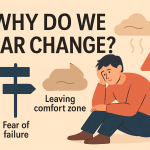Why Am I So Emotionally Reactive? Understanding Triggers and Emotional Flashbacks
Have you ever found yourself reacting in a way that felt too intense for the situation? Maybe you snapped at someone over something small, felt like shutting down during a disagreement, or suddenly became anxious for no clear reason.
You’re not “too sensitive” or “crazy.” You may be experiencing an emotional trigger—or even a flashback from a past experience that still lives in your nervous system.
Understanding what’s really happening when you’re emotionally reactive can help you respond with awareness instead of judgment.
💡 What Are Emotional Triggers?
An emotional trigger is anything—a word, a tone, a situation, a facial expression—that stirs up a strong emotional reaction rooted in past experiences.
In the moment, the situation might seem ordinary, but your brain interprets it as a threat because it’s linked to something painful from your past.
This could be:
- Being ignored in a meeting (linked to feeling invisible as a child)
- Someone raising their voice (linked to past emotional abuse)
- Being asked a question (linked to a fear of being wrong or judged)
These reactions aren’t always conscious—they come from your body remembering, even when your mind forgets.
🚨 What Are Emotional Flashbacks?
Emotional flashbacks happen when a current experience causes your brain to relive the feelings of a past event—even if the memory isn’t clear.
Unlike PTSD flashbacks that are visual or specific, emotional flashbacks are intense feelings that seem to come from nowhere.
Signs of an emotional flashback:
- Sudden rage, shame, fear, or panic that feels disproportionate.
- Feeling small, helpless, or “not good enough” in an everyday situation.
- The need to escape, withdraw, or defend yourself urgently.
You may not even realise you’re reacting to an old wound—but your body does.
🔍 Common Reactions and What They Mean
Everyone has different ways of responding when triggered. Common emotional reactions include:
✔ Fight – You get angry, defensive, or lash out.
✔ Flight – You avoid, overthink, or distract yourself.
✔ Freeze – You feel numb, dissociate, or can’t speak.
✔ Fawn – You people-please or abandon your needs to keep peace.
These responses aren’t weaknesses—they’re your nervous system trying to protect you from a perceived threat. The problem is, that threat may no longer be real—it just feels familiar.
💙 How to Start Managing Triggers and Reactions
The goal isn’t to never get triggered—it’s to recognise what’s happening and respond differently.
✔ 1. Increase Your Awareness
- Notice when your reaction feels bigger than the moment.
- Ask: “What does this remind me of?”
✔ 2. Learn to Ground Yourself
- Deep breathing, touching something cold, or focusing on your feet can help bring you back to the present.
- Grounding brings your nervous system out of survival mode.
✔ 3. Validate Your Emotions, Then Choose Your Response
- Remind yourself: “This is an old feeling. I’m safe now.”
- Pause before reacting—give your brain time to catch up.
✔ 4. Consider Therapy
- A therapist can help you unpack the source of your triggers and learn how to respond in healthier ways.
- You don’t have to carry the emotional weight alone.
🚀 Final Thought: You’re Not Overreacting—You’re Overremembering
✔ Emotional reactivity often has a root in past pain, not present drama.
✔ You deserve to feel safe, steady, and in control of your emotions.
✔ Learning your triggers is not a weakness—it’s a powerful act of self-awareness.
💙 If emotional triggers and flashbacks are affecting your daily life, therapy can help you reclaim your emotional balance and respond instead of react.




